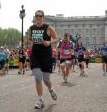Marathon safety: a step too far?
Is a new marathon safety rule going to spoil the fun?


Health and safety. It stopped our children playing conkers, and now it has found another way to spoil the fun ? without, I add, really helping the health and safety.
Marathon safety is right up there with Bonfire-night safety, or shooting safety. A marathon, or half-marathon, is a high-risk experience where big things can go wrong: just look at the four tragic deaths during the 2005 Great North Run.
However, the health and safety people have taken a step too far. Personal stereos and MP3 players have just been banned from the Norwich Half Marathon.
* Listen out for Rebecca opposing the ban on Radio 4's PM show on Friday, November 2, 2007 where you can post which music you like to run to
I asked the race director to comment on the ban, and his response is as follows: 'We, as an organisation hosting a mass participation event, have to establish safe systems for accepting the care of both the entrants and those they come in to contact with, regardless of their individual risk tolerance and attitude.'
He continues: 'The City of Norwich Half Marathon is a road race, not a solo training run. It takes nearly 2000 participants onto public highways not closed to traffic and brings runners into contact with marshals, pedestrians, cyclists and traffic approaching from the rear. Not to establish rules that protect all these parties in an organised event would be gross negligence.'
I understand his obligation of care to all the runners. However, this could ruin the future of long-distance running if other races follow suit.
Exquisite houses, the beauty of Nature, and how to get the most from your life, straight to your inbox.
There are two sorts of runner: responsible runners, and irresponsible runners. The former camp need no guidance on road safety; they will be wearing sensible kit; they will be adequately hydrated and rested; and they will respect the rules of the road.
Any music that they listen to will be at a moderate volume, and they will be watching out at all times for cars and race marshals giving instructions.
Irresponsible runners, of which I have seen a few (I have completed several half-marathons, marathons, and even a 35-miler), have no regard for their fellow runners. They run two or even three abreast on the road; they stop running without checking behind them; they veer across other runners' paths; they go out drinking the night before a race.
I could go on. However, banning personal stereos is not the answer. How will a novice, who will be attempting the 13.1-mile distance for the first time, complete the course without the support of an uplifting tune?
What about the more experienced runners, who are used to race conditions and enjoy it more with a jolly song?
Taking away the personal stereos will not make the race safe. I took part in the Norwich Half when it allowed MP3 players, and I did not see one incidence of reckless behaviour as a result of someone with an iPod.
If the ban hopes to make sure the runners hear the cars, well, the runners should be sticking like glue to the edge of the road anyway, whether or not a car is coming, so that they don't even have to change their position if a car approaches.
Also, even if you don't have music, it is sometimes difficult to hear a hybrid car, as they can be silent. This is where you have to assume that the cars will have noticed the race marshals in their high-visibility vests, as well as large volumes of runners on the road, and will drive accordingly.
It is all about allowing us to take responsibility for our own safety, and assuming that everyone around us will as well. A race will be a sorry affair if we have to assume that all the runners are selfish idiots, and that the car drivers are all driving with their eyes closed.
One novice runner I spoke to said she could never do a race of this distance without music. I fear this is what will happen. Would you want to run 13.1 miles for the first time in absolute silence?
Long-distance running is meant to be about fun: a physical and mental challenge. Health and safety rules such as these only serve to put people off.
To comment on this article, use the comment box below, or send an email to rebecca_pearson@ipcmedia.com
Country Life is unlike any other magazine: the only glossy weekly on the newsstand and the only magazine that has been guest-edited by His Majesty The King not once, but twice. It is a celebration of modern rural life and all its diverse joys and pleasures — that was first published in Queen Victoria's Diamond Jubilee year. Our eclectic mixture of witty and informative content — from the most up-to-date property news and commentary and a coveted glimpse inside some of the UK's best houses and gardens, to gardening, the arts and interior design, written by experts in their field — still cannot be found in print or online, anywhere else.
